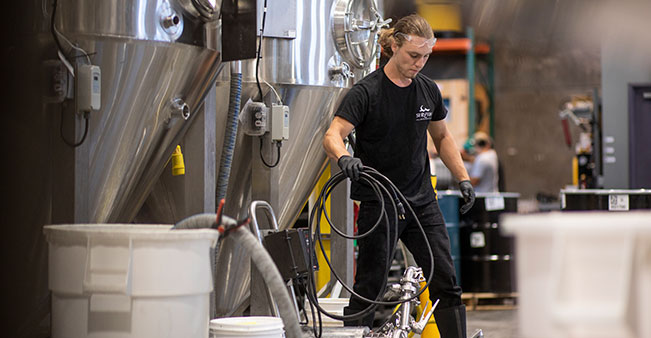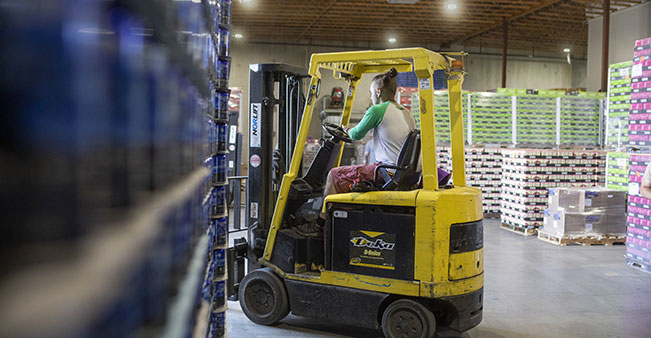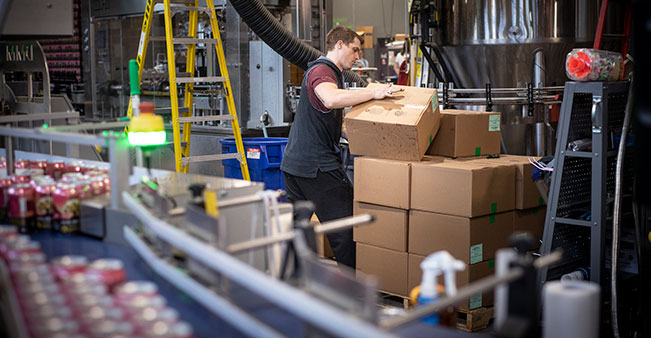Major Disruptions
To help businesses plan for the future, Umpqua Bank worked with economic experts to get their take on key trends and predictions for the year ahead. We also had our own leaders weigh in on how small and mid-sized businesses in the West can use this information to better position themselves.
Jump to: Supply Chain · Labor Market
Umpqua Client:
2 Towns Ciderhouse
Supply Chain
The supply chain upset is one of the more infamous economic side effects of the pandemic. Our experts anticipate businesses will see a gradual improvement, but not full resolution, of this problem over the course of 2022.
There’s no one reason for the global supply chain woes. A quick recap from economic analysis firm ECONorthwest: Initially, major exporters had to close factories to slow spread of infection and that hampered supply of many goods. U.S. manufacturers also anticipated a sharp downturn in the spring of 2020 and canceled orders, triggering a supply shock. Goods became scare, prices rose.
Consumer behavior also made a major shift. By mid-2020, many people — stuck at home and with extra money — bought more stuff, such as furniture, electronics, and home improvement goods. It was an unprecedented situation; businesses and suppliers didn’t have time or ability to adjust. That resulted in back-orders, crammed ports, not enough trucks (or drivers), and rising prices.


Economist Bill Conerly points out that imports have actually increased over 2019 levels, but spending grew even faster. He expects gradual improvements in delivery times and reliability in 2022.
Businesses should see a gradual improvement of supply chain fluidity as companies play catch up. The anticipated shift in consumer spending from goods to services may also help ease some of the pressure on the system. But businesses would be wise to learn their lessons from 2020 and 2021 and reevaluate their sourcing, inventory, manufacturing, and pricing strategies.

Richard Cabrera
Head of Middle Market Banking
Umpqua’s Richard Cabrera Provides Supply Chain Tips
Supply chain challenges are without question the top concern facing business customers in 2022. Combined with inflationary pressures and the specter of rising interest rates, businesses should mind this basic but important advice:
- Don’t be afraid to borrow, but don’t borrow in excess.
- Carefully manage inventory at levels you’re relatively confident can be liquidated.
- Don’t get overleveraged. Be sure to maintain a good balance between equity and debt in any assets you purchase.
Talk to a banker
Labor Market
The labor market is tight and will continue to be for years, said Conerly. Baby boomers are retiring, immigration is likely to remain low. The working-age population will hardly grow in 2030. And many workers are rethinking what is important to them in terms of work versus personal life. Higher wages will be necessary.
Conerly expects that hiring will become a little easier in 2022 — but just a little. The greatest gains will come to those companies that prioritize employee retention and recruitment.
ECONorthwest said ongoing concerns about COVID exposure in the workplace and childcare availability are still factors leading to short supply. Increased workloads and burnout are a big part of the “Great Resignation” too.
The firm said the fight against the virus will shape the 2022 labor landscape. If COVID-19 shifts from a pandemic to endemic situation, the workforce participation should rise and market for labor should loosen. However, if a new variant emerges, expect more of the same challenges in the year ahead.
Workplace safety, including clear distancing and contact tracing protocol, will remain important for businesses to keep in place until the virus is under control. And companies will have to invest in better compensation packages to attract hesitant workers, particularly in the high-need industries such as leisure, hospitality, and retail. Employers will have to offer flexible but predictable schedules, along with signing bonuses and other incentives.


Companies will also need to evolve in terms of culture and expectations. “In past generations, the expectation was that it was largely an employee’s responsibility to adapt to an established company culture,” said ECONorthwest. “Today, employers need to adapt as well as listen more carefully to the desires of their staff.”
The firm also said that businesses that pivoted from office to remote work benefited from carrying over the existing networks and personal relationship that existed before the pandemic. That social capital is harder to maintain or grow in a fully remote environment, and employers will rebuild relationship through a hybrid model.
Key Takeaways
-
Companies that prioritize a reliable supply chain can gain market share in 2022. Business leaders should ask where their supply chain is most vulnerable and what options are.
-
The greatest workforce gains will come to companies that prioritize employee retention and recruitment. Businesses should ask what is most important to employees.
-
Increase wages, improve scheduling, and offer signing bonuses to attract staff, particularly in uniquely tight industries.
-
Workplace safety protocol will remain important to maintain until the virus is under control.
Connect with an Umpqua banker to learn how we can help position your business for the future
Umpqua Bank works closely with its clients to truly understand their businesses and provide the best financial solutions for their needs. We have the market and financial expertise to help you prepare for whatever the future holds. If you’d like to talk with one of our bankers, fill out the form.

More Areas of Insight
The Economy
A look at the economy as a whole, including areas of major change like inflation.
Get the insights
Strategic Investments
What to consider with automation, commercial real estate, mergers & acquisitions, and more.
Get the insights
U.S. Policy & Cybersecurity
The policy issues that will matter the most in 2022 and including cybersecurity in your planning.
Get the insights







